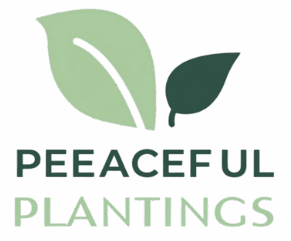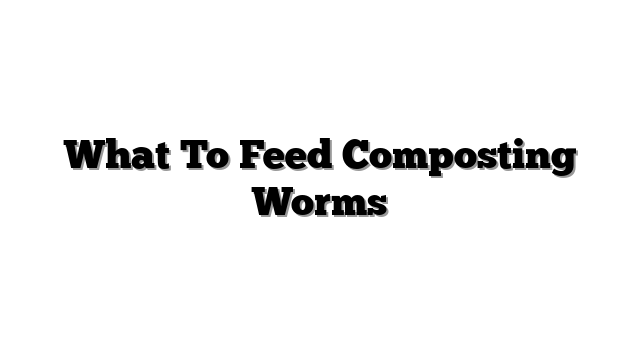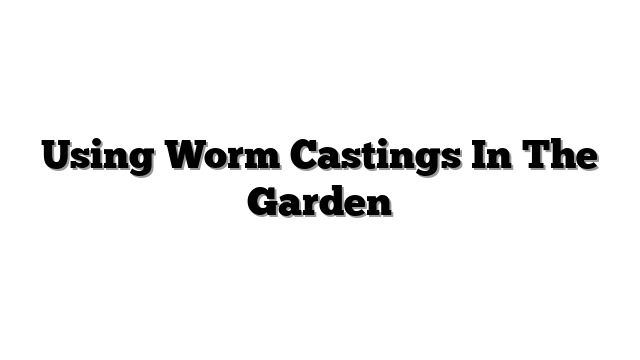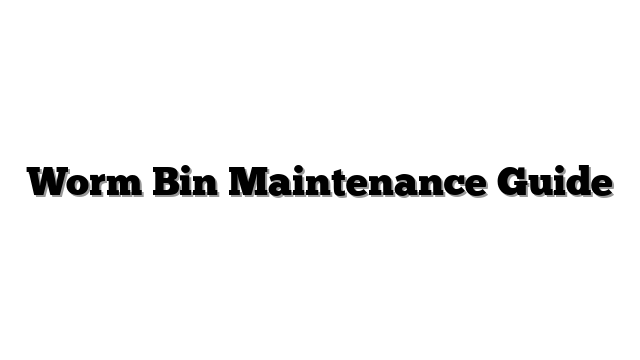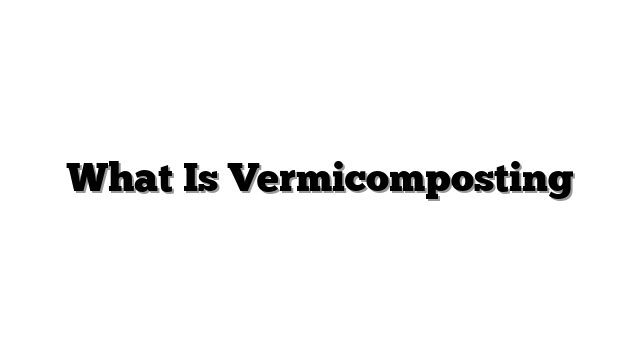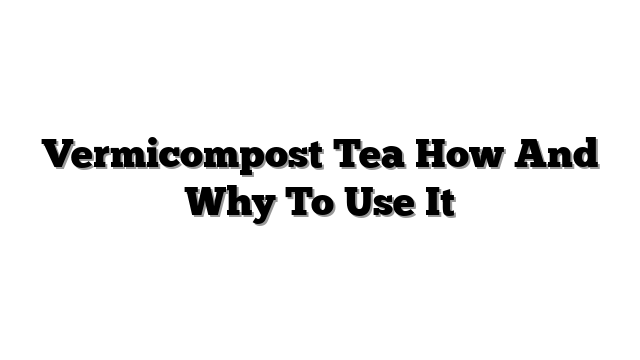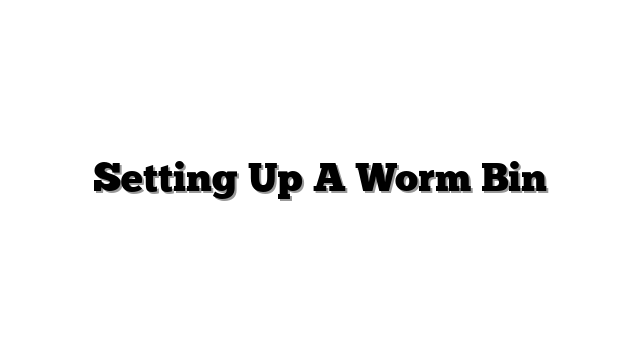What To Feed Composting Worms
Healthy plants make us happy. Gardeners want vibrant soil. But soil can be a challenge. Chemicals cost money. They hurt the earth. What is a natural way? Composting worms offer a powerful answer. They help soil become truly vibrant.
Food waste is a big problem. It fills landfills. It creates bad gases. Synthetic fertilizers cost money. They harm the environment. Worms can help with this. They are amazing allies. They turn waste into special soil. People call it “black gold.”
This guide helps you. It tells you what to feed composting worms. Your worms will stay healthy. They will make the best castings. Castings help your garden grow. This guide covers important ideas. We will look at the worms. We see what they eat. We learn what to avoid. Feeding tips are here. You learn about worm castings too. We cover plant health. We help gardening for beginners.
What to Feed Composting Worms is important. It makes your garden better.
Understanding Your Hungry Helpers: The Basics of Composting Worms
Meet the garden stars. These are composting worms. We often use Red Wigglers. Their science name is Eisenia fetida. They are great for bins. They live on the surface. Earthworms go deep. Red Wigglers stay up high. They eat food scraps easily.
They break down food. Small helpers work with them. These are tiny living things. Microorganisms help break down scraps. Worms and microbes work together. This process makes nutrient-rich soil. It changes waste into good stuff.
Worms need more than food. A good vermicomposting setup matters. They need bedding first. Shredded paper works well. Cardboard is also good. This gives them carbon. They need moisture. Think like a wet sponge. Not too wet. Not too dry.
Temperature is key. Worms like it not too hot. They like it not too cold. A range works best. They need air too. Aeration keeps the bin healthy. Air moves through the worm bin. This stops bad smells.
Choose your worms carefully. Get the right kind. Set up their home first. Make the bin ready. Add bedding and water it. Then add your worms. Feed them later. This starts your organic gardening journey. It builds soil health.
The Main Course: What Composting Worms LOVE to Eat
Worms have favorite foods. Giving them the right food is good. It makes them happy. It makes great castings. Offer them different kinds of food. Variety is good. Keep things balanced.
Kitchen scraps are great food. Fruit peels are good. Apple cores work. Avoid too much citrus at first. Vegetable scraps are good. Most veggies are fine. Skip oily food. Skip spicy food. Coffee grounds are excellent. They add nitrogen. They give worms grit. Grit helps them digest food.
Tea bags are okay. Take off the little tag. Eggshells are useful. Crush them into small bits. This gives worms grit. It adds calcium. Bread and pasta are okay. Use small amounts. They can stick together. Grains work too. Cooked or not cooked. Use them in small amounts.
Paper and cardboard help. Shredded newspaper is fine. Black and white ink is okay. Use plain cardboard. Take off tape. Remove labels. Paper egg cartons work. Toilet paper rolls work. Shred them up small.
Yard waste is okay. Use it in small amounts. Dead leaves are good. Make sure they are old leaves. Do not use fresh ones. Grass clippings work too. Use small amounts. Let them dry first. This stops the bin from getting hot.
Prepare food for worms. Chop it into small pieces. Tear it up. Smaller pieces break down fast. Large pieces take time. They can cause problems. You can freeze scraps first. This helps break cell walls. Food breaks down faster.
Start feeding slowly. Watch how much they eat. Do not give too much food. Overfeeding causes problems. See how fast food disappears. That tells you how much to feed. Provide a clear list of foods. Prepare them well. Know how much your worms need. This helps decomposition. It makes nutrient-rich soil. It supports organic gardening.
The Forbidden Feast: What NOT to Feed Composting Worms
Some foods hurt worms. Do not put these in the bin. They cause big problems. Bad food makes bad castings. Bad castings hurt plant health.
Do not feed worms meat. Do not feed them dairy. These foods attract pests. They smell very bad. They break down slowly. They can make the bin smell awful.
Oily foods are bad. Greasy foods are bad. They do not break down well. They can coat the worms. This makes the bin unhealthy. It lacks air.
Too much citrus is bad. Oranges, lemons, grapefruit. They make the bin too sour. This lowers the pH level. Worms do not like this. A little bit is usually okay.
Skip spicy foods. Avoid onions. Avoid garlic. Worms might not like these smells. They might move away.
Processed foods are bad. Salty foods are bad. They are not natural for worms. They can harm the worms. They can bring pests.
Never add pet waste. Never add human waste. These have bad germs. Germs hurt people. They can hurt worms too.
Do not add sick plants. Do not add plants with bugs. You can spread problems. Your garden might get sick.
Non-biodegradables do not break down. Plastics, metal, glass stay forever. Treated wood is bad. Keep these out.
Shiny paper is bad. Magazines are bad. The ink or coating can hurt worms.
These bad foods cause smells. They bring pests. They make the bin unhealthy. They lack aeration. They hurt the worms. This causes troubleshooting worm bin issues. Avoid this list. It helps keep your worms safe. It helps with waste reduction.
Feeding Strategies for Optimal Worm Health and Casting Production
Feeding worms needs care. Doing it right helps worms. It makes more castings. Castings have many worm castings benefits.
How do you feed them? Bury the food. This is a good way. It stops pests. It stops smells. It keeps the bin moist. You can feed on the surface. Use small amounts. Use dry food for this.
Move where you feed. Feed in different spots. This makes worms move. It helps aeration. It helps them eat all the food.
Watch your worms eat. Do they eat the food fast? Food piles up if you feed too much. The bin might smell bad. Worms look thin if you feed too little. Bedding goes away too fast.
Do not overfeed. This is a main problem. It causes troubleshooting worm bin issues. You get bad smells. You get spots without air. Worms can get sick.
Feeding changes bin conditions. It affects moisture level. It affects pH level. Add dry bedding if it is too wet. Add crushed eggshells if it is too sour. This helps worms digest. It balances the pH.
Add bedding with food. Add shredded paper or cardboard. This is carbon. Food scraps are nitrogen. Worms need both. This keeps the bin healthy. It keeps a good balance.
Feed them step by step. Watch what happens. Change how you feed based on what you see. Deal with small problems quickly. Fruit flies happen sometimes. This often means too much food. Or food on the surface. Keep your worm bin healthy. Avoid worm bin smells. Keep good aeration. Maintain the right moisture level. Check the pH level. This helps soil health. It makes nutrient-rich soil.
The Payoff: Harvesting and Using Your ‘Black Gold’
The reward is coming. It is called worm castings. This is worm poop. It is very good for plants. It is full of nutrients. It has many helpful microbes.
What are worm castings? They are like rich soil. Worms eat food and bedding. What comes out is castings. It is a super soil helper. It feeds plants slowly. It does not burn plants.
Worm castings benefits are many. They make soil structure better. This helps soil health. They add nutrients. Plants can use them easily. This increases soil fertility. Microbes in castings help plants. They fight plant diseases.
Castings hold water better. They help soil get air. This improves aeration.
How do you get castings? You can move the food. Add new food to one side. Worms move to the new food. You can take out the old side. You can use a screen. Push the bin stuff through a screen. Castings go through. Worms and big pieces stay. You can dump the bin out. Then sort it by hand. This takes more time.
Use castings in your garden. Mix them into potting soil. Add them to garden beds. Put them around plants. This is top dressing. You can make “worm tea”. Mix castings with water. This makes liquid food. It helps plants grow strong. Use castings for starting seeds.
Get your castings ready. Use the best way for you. Add castings to your soil. See your plant health improve. Watch your plant growth. Castings make nutrient-rich soil. It is black gold. It helps organic gardening. It supports sustainable gardening.
Integrating Vermicomposting into Your Sustainable Garden
Worm bins fit well. They work with sustainable gardening. They help the earth. They work with new ideas.
Think about food waste. It fills our trash cans. Worms eat this waste. It stays out of landfills. Landfills make bad gases. Worms help stop this. This is waste reduction.
It is a closed loop. You make waste at home. Worms turn it into good stuff. You use that good stuff for your garden. Your garden gives you food or beauty. It is a cycle. It helps a circular economy.
Worm bins compared to piles. Piles get hot. Worm bins do not. Worms work faster on some things. Bins are good for small homes. Piles need more space.
Worm bins fit 2025 ideas. Sustainable gardening is popular. Worms help this. Using natural soil helpers is key. Native plants are trending. They love healthy soil. Castings help native plants thrive.
Small spaces need good soil. Vertical gardening uses pots. Container gardening needs good soil. Castings are perfect for pots. They make the small soil volume better. People care more about soil. They want healthy soil. Worms make soil healthy. They add good microbes.
Add worm composting easily. Put a bin on your balcony. Keep one in your kitchen. It does not take much space. See how much waste you compost. Track it over time. It feels good to help the earth. It feels good to use organic gardening. It improves soil health.
FAQs
What is the best food for worms? Worms love fruit and veggie scraps. They like coffee grounds too. Shredded paper and cardboard are needed.
How often should I feed my worms? Start with a little food. Watch them eat it. Feed them again when food is almost gone. This might be once a week.
Can I put meat in my worm bin? No, do not put meat in. It attracts pests. It smells bad. It causes worm bin problems.
Why does my worm bin smell? Bad smells mean problems. You might be overfeeding. The bin might be too wet. It might lack air. This is troubleshooting worm bin.
How fast do worms eat food? It depends on many things. Bin size matters. Worm numbers matter. Food type matters. Small pieces break down faster. It can take a few weeks for food to go away. This helps plant health. It helps gardening for beginners.
Conclusion
Feeding worms correctly matters. It keeps them healthy. It makes great worm castings. Castings make soil health better. They help plant health. Your plants will grow strong.
Feeding composting worms is simple. It is a good step for you. It makes your garden sustainable. It helps reduce food waste. Nutrient-rich soil comes from good feeding.
Start your worm bin today. Try feeding different scraps. See how worms make a difference. Watch your garden grow better. It is a rewarding process. Try it yourself. What questions do you have? Learn more about organic gardening here.
